#schuyler correspondence
Text
Philip Schuyler to Elizabeth Hamilton, Albany, [May 11, 1802]
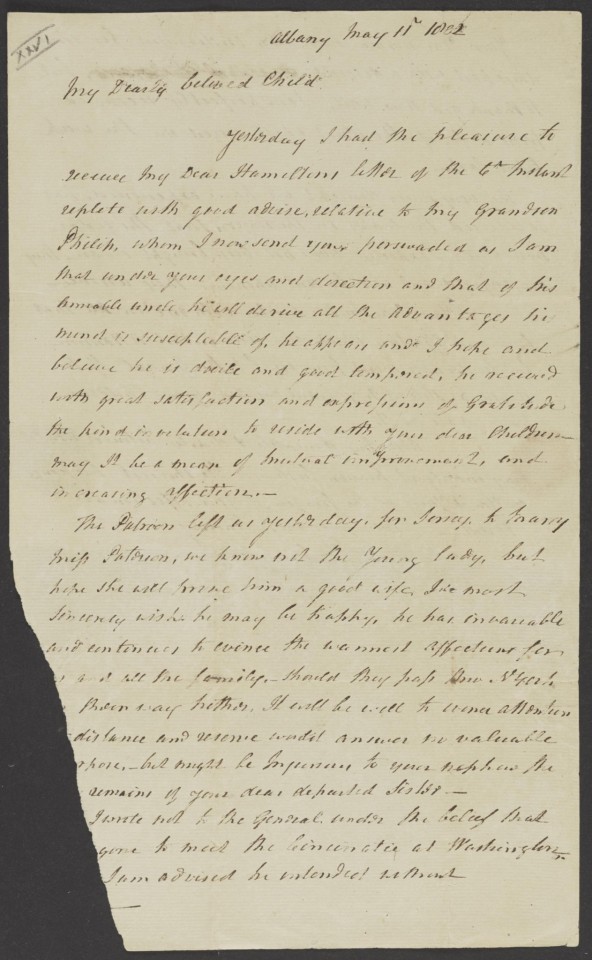
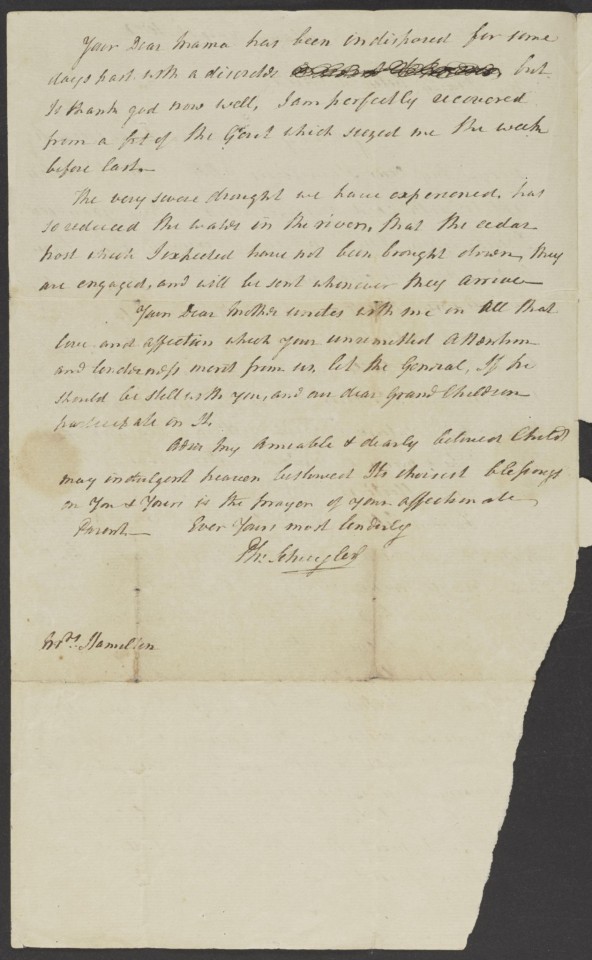
Albany May 11th 1802
My Dearly beloved child
yesterday I had the pleasure to receive my Dear Hamiltons letter of the 6th instant replete with good advise, relative to my grandson Philip, whom I now send you perswaded as I am that under your eyes and direction and that of his amiable uncle he will derive all the advantages his mind is susceptible of, he appears and I hope and believe he is docile and good tempered, he received with great satisfaction and expressions of gratitude the kind invitation to reside with your dear children may it be a mean of mutual improvement, and increasing affection.
The Patroon left us yesterday, for Jersey to marry Miss Paterson, we know not the young lady, but hope she will prove him a good wife, I do most sincerely wish he may be happy, he has invariable ___ and continues to evince the warmest affection for ___ and all the family, should they pass thru N York ___ their way hither, it will be well to evince attention ___ distance and reserve until answer no valuable ___ pose(?)._ but might be in general to your nephew the ___ remains of your dear departed sister
___ I write not to the General, under the belief that ___ gone to meet the Cincinnati at Washington. ___ I am advised he intended without
Your dear mama has been indisposed for some days past with a disorder (...) but I thank god now well. I am perfectly recovered from a fit of the gout which seized me the week before last.
The very severe drought we have experienced has so reduced the water in the river, that the cedar post which I expected have not been brought down, they are engaged, and will be sent whenever they arrive.
Your dear mother unites with me in all that love and affection which your unremitted attention and tenderness merit from us, let the General, if he should be still with you, and our dear grand children participate in it.
Adieu my amiable & dearly beloved child may indulgent heaven bestowed its choisest blessings on you & yours is the prayer of your affectionate parents.
Ever yours most tenderly
Ph. Schuyler
Mrs Hamilton
#elizabeth hamilton#elizabeth schuyler#philip schuyler#hamilton correspondence#schuyler correspondence#1802
21 notes
·
View notes
Note
Looks like ur still active… cool, what do you think about the theory (perpetuated by one person: me ur thoroughly uninformed anon ask) that Betsey could have been dyslexic? There’s a sharp decline in quality between her letters and her family members’ letters, and she was, again, “lazy at the pen.” Also we know she was pretty good at art. There’s genuinely no conclusive evidence but you know more than me (I just like to diagnose dead people with things lmaoo) although she *did* copy her husband’s work & such.
You'd have to point out to me which letters you are referring to as a "sharp decline in quality" comparing her letters to her family's letters. It's been awhile, but I've seen photos of her 1781 letter to her sister Peggy, the 1781 letter of AH to Robert Morris that she either copied sections of for him (less likely) or that he was transcribing to her (more likely), and then the 1804 onwards letters to various people. I've also seen several of Angelica S. Church's letters and Philip Schuyler's letters, and I would not note a very significant difference in her letters above compared to theirs. In the above examples, EH's penmanship was better than George Washington's, by era standards, and it's sharper (and largely with fewer misspellings) than her father's, although punctuation for both of those two is a bit iffy.
On a more technical note, I'm not an expert on learning disorders in the late 18th century but considering the recorded thoughts around dyslexia in the late 19th century, I think EH would have been notably regarded as having major deficits if she were unable to read well. Same if she had dysgraphia - difficulty writing legibly. EH misspells at times, but she doesn't flip the shapes of her letters or have misspellings that don't make phonetic sense. Also considering her many roles, including as society leader and household manager, I'd consider it extremely unlikely that she had either learning disability. I also doubt AH would have chosen her as the mother and educator of his children - she would have been responsible for teaching them to read and write - nor expressed stuff like, "I cannot tell you what extacy I felt in casting my eye over the sweet effusions of tenderness [her letter to him] contains," and write her pages of expressions of his own feelings that he told her not to share with others. (He did encourage her to spend all of her free time reading in July 1780.)
I'll get into it in an upcoming post, but I think people underestimate how busy and active EH was, and I just don't think, with the sit-down time that she had, that correspondence was a high priority for her. She preferred to spend that time active with her needle instead of her pen. (Both AH and Angelica note that she's lazy/idle with the pen, not that it's of any actual difficulty for her.)
3 notes
·
View notes
Text
#save elizabeth schuyler hamilton from male biographers 2024
Just got pissed off so bad. I'm in the middle of reading Burr, Hamilton, and Jefferson: A Study in Character, which presents an intriguing argument that Burr deserves to be put back into the Founding Father Pantheon, so to speak. The author doesn't shy away from hitting hard against the idea that Jeff & Ham were morally superior to Burr, and I was on board! Ready to go!
But then. During the discussion of the women in each of their lives, the author decides the best way to further promote Burr's attitude towards women compared to Jefferson and Hamilton is to disparage Martha Jefferson & Elizabeth Hamilton?
On Martha Jefferson:
Martha Wayles Skelton had been a widow, and none of Jefferson's biographers, even the resourceful Fawn Brodie, has been able to tell us much about her—from the solitary letter remaining to us in her hand or the accounts of their contemporaries—beyond the general impression that she was handsome, musical, and frail.
On Elizabeth Hamilton:
Hamilton's Elizabeth was an heiress, the daughter of an upstate squire, Philip Schuyler, with Livingston and van Rensselaer connections. She was plain, straightforward, loyal, and neurasthenic, endured his flagrant and frequent infidelities, and lived to the brink of the Civil War.
I'm sorry, I don't know enough about Martha J. to protest to her characterization, but I think I can say something about Eliza. Plain? Neurasthenic? And once again, annoyed at the lack of citation or evidence for flagrant and frequent infidelities - but putting that aside, even if it were true, I don't like how her staying in her marriage is subtly implied to be some failure or at least less interesting than a woman who didn't "endure" them. There's a lack of consideration of both her own strength & the societal circumstances of that time that would have influenced her actions.
On Theodosia:
Her character emerges from their large and fervent correspondence. She was confident, well connected, well read, beautiful even after a burn scarred her face, witty, worldly, and full of expectations of him.
Okay. The author saw the point and it sailed over his head. "From their large and fervent correspondence" is key here. Like I said earlier, I don't know enough about Martha Jefferson, but I bet that "handsome, musical, frail" is probably not an all-encompassing picture of her. The similarity between her and Eliza? We don't have the letters that they wrote to their husbands. It's unfair to judge Theodosia (don't get me wrong! she was well read and intelligent, that's not what i'm denying) from her correspondence with Burr, but then not acknowledge that the lack of that perspective would impact how we view the other two women.
And to top it all off:
Unlike Jefferson's and Hamilton's, Burr's character was molded by the love of a woman of immense force and intelligence.
Neither Hamilton nor Jefferson married a woman who evidenced such force of character and independence of view.
Jesus Christ. There's plenty to criticize about Jefferson & Hamilton, and I really wanted to see a well-reasoned argument about Burr's character and whatnot but this lacks nuance and is unnecessarily dismissive. It pisses me off that a book that seems determined to break down the idolized version of Hamilton, somehow ends up using his wife to further their angle, just like biased Hamiltonian biographies. In both cases, Eliza is the plain, unintelligent, steadfast wife. For sympathetic authors like Chernow, that's somehow justification for the Reynolds affair. For Roger G. Kennedy, that's used in an argument against her husband. "Let's talk attitude towards women! Hamilton & Jefferson didn't have intellectual wives! Point for Burr!"
I don't know nearly enough about Martha Jefferson to say anything of merit, but really?
To give credit where credit is due, I think Kennedy is trying to make the point here that Theodosia Bartow Burr was a major influence on Burr, as "Burr's character blossomed in the radiance of his wife and mentor". He also goes on to talk about various genuine reasons why Burr's attitude towards women is noteworthy. But I still don't like the way he dismissed the other two women as what? Not smart enough to help their husbands' characters blossom? Maybe there's merit to this book outside of this one section, The Women, but right now I'm not in the mood. Am I being dramatic? Idk.
#aughh i'm pissed so maybe i'm being too dramatic#idk let's post it on the internet for everyone to see. smart decision.#alexander hamilton#thomas jefferson#aaron burr#martha jefferson#elizabeth schuyler#elizabeth hamilton#theodosia bartow burr#historical hamilton#amrev#elizabeth schuyler hamilton
50 notes
·
View notes
Note
round up of you’re best reads this year??
I have read way less books this year compared to previous years (like half of what I usually read and very few novels) but here you go
poetry: collected poems by james schuyler, seeing the body by rachel eliza griffiths, a dangerous place by chelsea desautels, burn lake by carrie fountain, another last call: poems on addiction and deliverance edited by kaveh akbar and paige lewis, how to maintain eye contact by robert wood lynn, winter stranger by jackson holbert, you can be the last leaf by maya abu al-hayyat, please make me pretty, I don’t want to die by tawanda mulalu, enemy of the sun: poetry of palestinian resistance edited by naseer haruri and edmund ghareeb, revolutionary letters by diane di prima (50th anniversary edition)
fiction: her body and other parties by carmen maria machado (short stories), the raptures and the fire starters by jan carson, les choses humaines by karine tuil, le pays des autres by leila slimani, the idiot by elif batuman
non-fiction: in the dream house by carmen maria machado, faith, hope and carnage by nick cave, the correspondance of antoine de saint exupéry and consuelo de saint exupéry, lit by mary karr, the correspondance of albert camus and maria casarès
#tbf albert camus and maria casarès correspondance is over 1000 pages so ! it has been with me half of the year#but still. need 2 go back to how I used to read
55 notes
·
View notes
Text
On partiality
A few thoughts on why 'partiality' - even more than 'love' - is an important expression in Hamilton and Laurens’ correspondence.
Partiality is a word that denotes fondness, preference or bias for one person over others, often used in sentimental writing as a synonym for love (both familial and romantic). Jane Austen uses both forms in Pride and Prejudice (1813):
Miss Bennet’s astonishment was soon lessened by the strong sisterly partiality which made any admiration of Elizabeth appear perfectly natural [...]
I had often seen him in love before. […] From that moment I observed my friend’s behaviour attentively; and I could then perceive that his partiality for Miss Bennet was beyond what I had ever witnessed in him.
Hamilton himself uses partiality in the context of love in a letter to Elizabeth Schuyler:
I believe in my soul you are an inchantress; but I have tried in vain, if not to break, at least, to weaken the charm—you maintain your empire in spite of all my efforts—and after every new one, I make to withdraw myself from my allegiance my partial heart still returns and clings to you with increased attachment.
Alexander Hamilton to Elizabeth Schuyler, 5 October 1780
But partiality is not a direct synonym for love - the nuance comes from the fact that it is an antonym of impartiality.
An enlightened 18th century gentleman walked a fine line to balance rationality - which elevated reason, intellect and justice (especially in the spheres of public life, such as politics and business) - with sentimentality - which expected him to display profound emotion at appropriate (usually private) moments, as a testament to his morality.
Expressing love was certainly a virtuous thing - a man could profess love for his family, spouse, country, comrades, beliefs (religious or otherwise), and so on - but when it was labelled partiality, that love was made less gentlemanly, less virtuous and noble. Partiality masked flaws, reducing the ability to make objective choices, and hinted at a weakness of character in a gentleman who was supposed to be fair, just and disinterested in his dealings. Therefore, a man who called himself partial was admitting that he allowed his feelings to affect his integrity, and was showing preference one person over others in a way that was possibly unfair or unwarranted - an intimate personal favouritism.
We see it used in this form in works spanning the century. In Alexander Pope’s 1717 poem, Eloisa to Abelard, Eloisa begs for her “partial eyes” to be turned away from her lover, Abelard, and back to pure religious love.
Yet then, to those dread altars as I drew,
Not on the Cross my eyes were fix'd, but you:
Not grace, or zeal, love only was my call,
And if I lose thy love, I lose my all.
[…]
Ah no! instruct me other joys to prize,
With other beauties charm my partial eyes,
Full in my view set all the bright abode,
And make my soul quit Abelard for God.
In Charlotte Smith’s Emmeline (1778), partiality is contrasted with virtuous affection:
But for your charming friend my heart long retained its partiality; nor would it ever have felt for her that pure and disinterested friendship which is now in regard to her its only sentiment, had not the object of my present regret and anguish been thrown in my way.
In Evelina (1778), Fanny Burney shows the peril of partiality in masking flaws.
Yet perhaps I have rather reason to rejoice than to grieve, since this affair has shown me his real disposition, and removed that partiality which, covering his every imperfection, left only his virtues and good qualities exposed to view.
[...]
You flattered yourself that your partiality was the effect of esteem, founded upon a general love of merit, and a principle of justice; and your heart, which fell the sacrifice of your error, was totally gone ere you expected it was in danger.
We see this subtlety of meaning in Hamilton’s April 1779 letter to Laurens:
But as you have done it and as we are generally indulgent to those we love, I shall not scruple to pardon the fraud you have committed, on condition that for my sake, if not for your own, you will always continue to merit the partiality, which you have so artfully instilled into me.
In using feigned legalese (“pardon the fraud you have committed”), Hamilton puts himself in the role of a judge, but admits that he is not an impartial one - he is acting self-awarely according to his personal bias, and the love he expresses is tinged by it. Hamilton uses partiality again in his 8 January 1780 letter, after Laurens tries to promote Hamilton as a better candidate for the diplomatic mission to the court at Versailles:
Believe me my Dr Laurens I am not insensible of the first mark of your affection in recommending me to your friends for a certain commission. However your partiality may have led you to overrate my qualifications that very partiality must endear you to me.
In other words - your affection means that you’re not being objective about me, and that’s adorable. He’s teasing, acknowledging both his own shortcomings and Laurens’ inability or unwillingness to see them. Hamilton puts it in even plainer terms in his 30 June 1780 letter, in which he discusses the possibility of Laurens being paroled early. He contrasts both the “love” the military family feels for Laurens and the fair and objective rules of war with his own subjective affection:
I have talked to the General about your exchange; but the rigid rules of impartiality oppose our wishes. I am the only one in the family who think you can be exchanged with any propriety, on the score of your relation to the Commander in Chief. We all love you sincerely; but I have more of the infirmities of human nature, than the others, and suspect my self of being byassed by my partiality for you.
In sum, Hamilton’s written correspondence expresses love for Laurens in a variety of ways beyond the obvious - the word ‘love’ itself is indeed less telling than the other phrases he uses. In the context of the period, calling both himself and Laurens partial towards each other suggests that their affection was not just the pure and rational comradeship of fellow-soldiers, but a more personal, intimate and subjective sentiment.
#historical john laurens#historical alexander hamilton#john laurens#alexander hamilton#historical lams#18th century history#sentimental language#queer history
137 notes
·
View notes
Note
Hi! Were there any instances of Laurens being jealous?

Quite.
Although I wouldn't exactly blame him for such, honestly. The prime examples I will be using are in regards to Hamilton's marriage with Elizabeth Schuyler. As they are what was mentioned in the post that these asks stem from.
I would take Hamilton as a great source of reading Laurens's character, with how close of lovers they were. So it is notable that Hamilton seems to sort of be aware of Laurens's envy, and mentions it a few times in their letters. For starters, in the “Cold in my professions, warm in my friendship...” letter [April 1779] Hamilton goes on a long ramble of Laurens finding him a wife in South Carolina. As Hamilton was jealous himself after discovering Laurens's, probably never mentioned before, wife, Martha Manning. In a way of petty revenge, he spends a long paragraph giving the details he wants in a wife, knowing it will feist him, as he says at the end;
“Do I want a wife? No—I have plagues enough without desiring to add to the number that greatest of all; and if I were silly enough to do it, I should take care how I employ a proxy. Did I mean to show my wit? If I did, I am sure I have missed my aim. Did I only intend to frisk? In this I have succeeded, but I have done more.”
(source)
Fast forward, around the summer of 1780, and Hamilton is to be wedded to Elizabeth Schuyler. When reading Hamilton's letters or discussions of Elizabeth, they are always extremely affectionate and always with adoration in her regards. So it is interesting that when Hamilton must confess the news to his lover, he tries hard to describe Elizabeth in the most dull terms he can to probably try and ease Laurens's jealousy. As mentioned in another letter while Laurens was a prisoner of war [30 June 1780];
“Have you not heard that I am on the point of becoming a benedict? I confess my sins. I am guilty. Next fall completes my doom. I give up my liberty to Miss Schuyler. She is a good hearted girl who I am sure will never play the termagant; though not a genius she has good sense enough to be agreeable, and though not a beauty, she has fine black eyes—is rather handsome and has every other requisite of the exterior to make a lover happy. And believe me, I am lover in earnest, though I do not speak of the perfections of my Mistress in the enthusiasm of Chivalry.”
(source)
With these instances in mind, they heavily imply Laurens was prone to being jealous (And I mean, can you blame him? It's literally his lover getting married away).
Even more so, Laurens's jealousy never seemed to have faded. Throughout the surviving correspondence we have between Hamilton and Laurens, Laurens never mentions Hamilton's new family, not even when Hamilton would bring them up continuously in his letters. Laurens never spoke of Elizabeth, in almost refusal to accept that she was Hamilton's wife or her existence.
There is only the one moment Laurens spoke of Hamilton's family, and it was bitter resentment towards Hamilton's firstborn son, Philip Hamilton, taking up all of Hamilton's time. He writes with complaints that Hamilton is spending too much of his time, or is too indulged, in his private family life. Which isn't too unexpected when you consider how we all know Hamilton tended to be as a newly, but also proud, papa — for example, his affectionate and rambling letter to Meade about Philip as well. Laurens must have been annoyed, or hurt even, by the lack of letters. And when there was letters, they were about his grand new family that didn't involve Laurens. So with boiled envy, Laurens wrote [July 1782];
“Your private affairs cannot require such immediate and close attention; you speak like a pater familias surrounded with a large family numerous progeny_”
(source)
An interesting detail about the original letter, ( Pointed out by @john-laurens who has the facsimile on their blog ) that Laurens chose to scratch out “large family” and replace it with “numerous progeny”, as to instead change the focus from the Hamilton family as a whole to just Hamilton's child. Thus Laurens continues to fail to mention Elizabeth in any of his letters, even adamantly purposefully. Tis clear here that Laurens actively chose to go back on his wording to avoid any mention of Elizabeth, even indirectly.
In Laurens's defense — even when really condemnable — as much as Hamilton was fully accepting of being married and still having a relationship with Laurens, JL himself wasn't as keen (He was somewhat, as they still obviously continued with affectionate letters; even after matrimony). He was often feeling alone and depressed during their letters, and Hamilton's reminders of his seperate family and loved ones was not helping in the slightest.
#amrev#american history#american revolution#alexander hamilton#historical alexander hamilton#john laurens#historical john laurens#lams#historical lams#elizabeth schuyler hamilton#elizabeth hamilton schuyler#elizabeth schuyler#elizabeth hamilton#history#hamilton family#cicero's history lessons#queries#sincerely anonymous
236 notes
·
View notes
Text
July
I was working on a scene within The American Icarus earlier today set In February, 1776. However as I was hitting another wall of writer’s block I was reminded that Independence Day is fast approaching, and how it was funny that I was working on TAI right then. But then I started to remember all the stuff that went down any given July for Hamilton (which I will eventually write into the series) and it hit me that July was really not this man’s best month. Case in point, in chronological order of course:
July 12th, 1776: In an attempt to fight off warships which had sailed up the Hudson that many other companies neglected in light of the recent celebrations over the publication of the Declaration of Independence, one of Hamilton’s four six-pound cannons exploded (why is unclear). The explosion killed between 1 and 6 men, and injured between 1 and 5.
July 1st, 1778: According to an account left by John Laurens, he, Hamilton, and General Baron von Steuben and his men were nearly taken prisoner by a company of British dragoons when they accidentally encountered them.
July 4th, 1779: Hamilton is informed via a letter written on this date by John Brooks that according to an unnamed person (who would be revealed to be William Gordon), a Francis Dana had stated that in a coffee house in Philadelphia, Hamilton had declared that “it was high time for the people to rise, join General Washington, and turn Congress out of doors.” This of course enraged Hamilton, who promptly sent Dana a letter on July 11th. This opening of correspondence would lead to Hamilton threatening duels.
July 2nd-4th, 1780: In a letter to his future wife, Elizabeth Schuyler, Hamilton comments that Washington had “half consented” to him traveling to Pennsylvania to meet with Laurens who was then a prisoner of war. However, it is unclear and even unlikely, that Hamilton was able to meet with Laurens at this time.
July 18th, 1795: Upon the announcement that a protest was to be held against the Jay Treaty, Hamilton positioned himself to create a counter-protest. However, his audience was less than considerate, and overpowered his speech; a rock being claimed to have been thrown at Hamilton’s head. Angered, Hamilton then stormed off, and within the hour in an attempt to stop an argument he encountered, more were created, all resulting in Hamilton taking up challenges to duels—even going as far as to challenge the entire Republican Party (or as he called them according to accounts, “the detestable faction”) to duels.
July 11th, 1797: After information of the Reynolds Affair leaked, and upon realizing he had never received a confirmation of secrecy from James Monroe who was present when he had been forced by questioning to reveal the affair and present documents, Hamilton arrived with his brother-in-law, John Barker Church, to confront Monroe. The conversation quickly became heated, with both Hamilton and Monroe jumping up from their chairs each prepared to grab pistols and meet on a dueling ground. This affair of honor was stopped however by Monroe’s friend who managed to calm the two seething men down.
July 11th, 1804: After weeks of correspondence between Hamilton, Aaron Burr, and their second’s Nathaniel Pendleton and William Van Ness, Hamilton met Burr on a cliff side in Weehawken, New Jersey to settle an issue of honor originating from comments Hamilton claimed he could not recall at a dinner he attended back in March. It is unclear of the actual details as to what occured on this dueling ground, but while Burr would walk away to return to his home and share a breakfast with a friend, Hamilton would leave with a mortal injury.
July 12th, 1804: Surrounded by the presence of his family and friends, Hamilton passed away about 2 p.m., EST, from the injury received the previous day.
See? Truly wild. I am writing this late at night, so if there is something I messed up on or missed entirely, please don’t hesitate to let me know. This is just a silly observation with all the stuff I have to keep tabs on in working on The American Icarus lol.
#grace’s random ramble#alexander hamilton#amrev#american history#july#historical alexander hamilton#the american Icarus#TAI
23 notes
·
View notes
Text
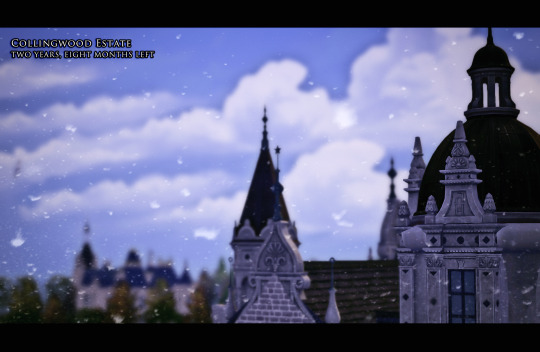

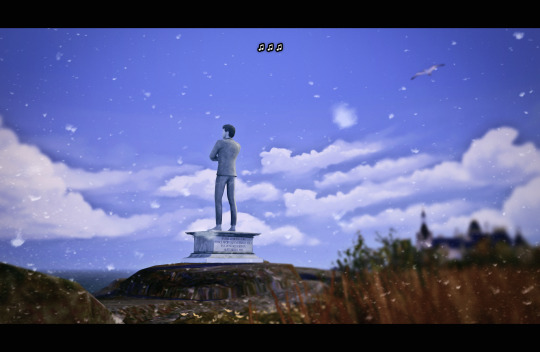
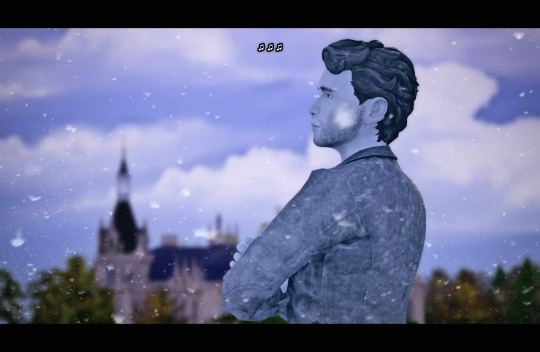


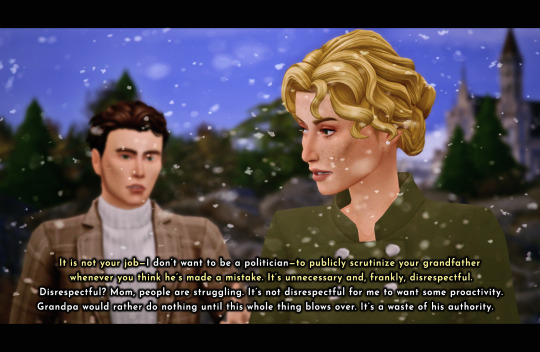
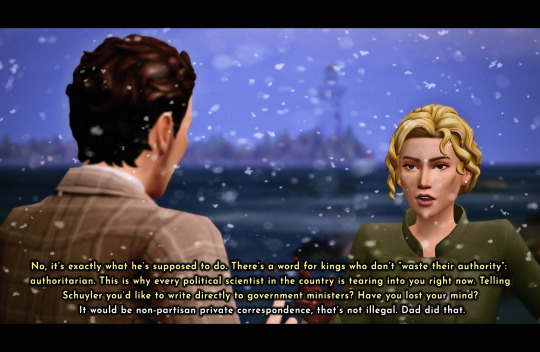

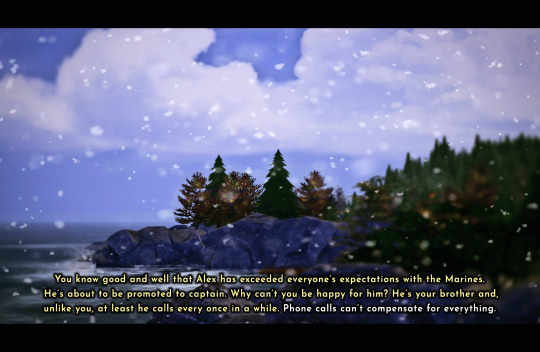
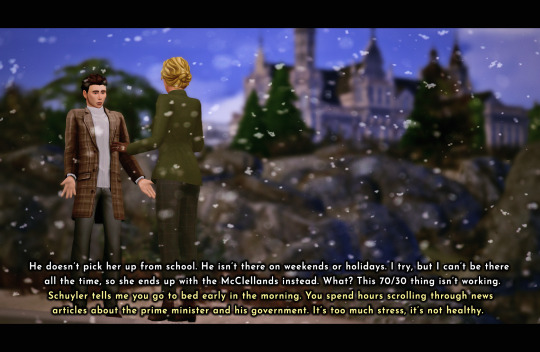
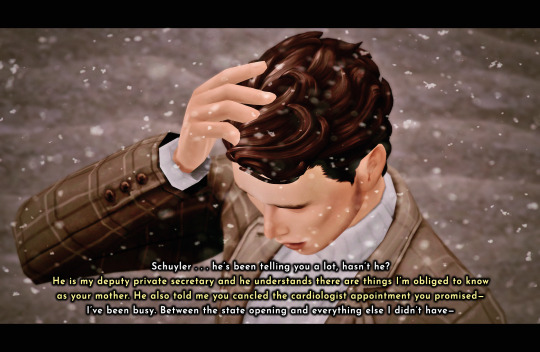
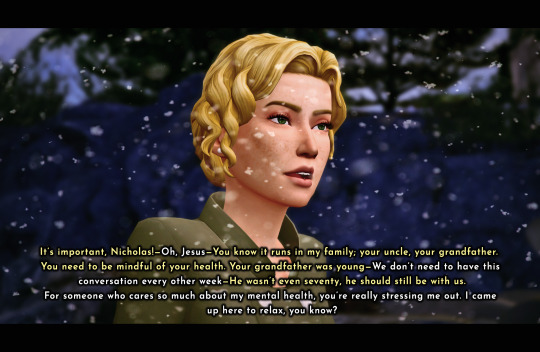
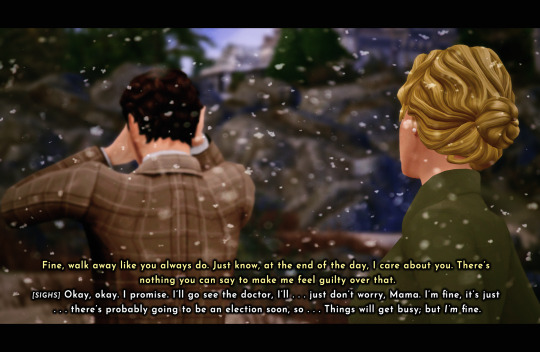
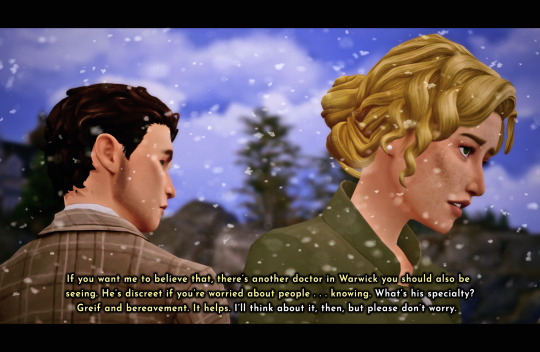
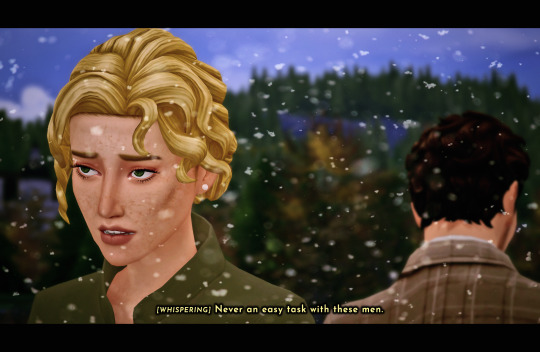

beginning - previous - next
[NICHOLAS] You’re being dramatic. In the grand scheme of things this doesn’t even register as important. At least, it won’t to him.
[TATIANA] You don’t think it’s important because you never consider the impact of your actions.
[NICHOLAS] I already told you: it won’t register as important. It won’t to him, anyway.
[TATIANA] You never consider the impact of your actions. You’re not a politician, Nick.
[TATIANA] It is not your job
—[NICHOLAS] I don’t want to be a politician—
[TATIANA] to publicly scrutinize your grandfather whenever you think he’s made a mistake. It’s unnecessary and, frankly, disrespectful.
[NICHOLAS] Disrespectful? Mom, people are struggling. It’s not disrespectful for me to want some proactivity. Grandfather would rather do nothing until this whole thing blows over. It’s a waste of his authority.
[TATIANA] No, it’s exactly what he’s supposed to do. There’s a word for kings who don’t “waste their authority”: authoritarian. This is why every political scientist in the country is tearing into you right now. Telling Schuyler you’d like to write directly to government ministers? Have you lost your mind?
[NICHOLAS] It would be non-partisan private correspondence, that’s not illegal. Dad did that.
[TATIANA] It wasn’t right when he did it, either. If you want to help the current situation, find a charity
to support. Boosting morale, keeping up a united front as a family, that’s our job.
[NICHOLAS] Mom, do you see anyone here willing to even pretend that we’re united? When was the last time you’ve seen Alex? By the way, is he still at Scarborough or did they finally let him go?
[TATIANA] You know good and well that Alex has exceeded everyone’s expectations with the Marines. He’s about to be promoted to captain. Why can’t you be happy for him? He’s your brother and, unlike you, at least he calls every once in a while.
[NICHOLAS] Phone calls can’t compensate for everything.
[NICHOLAS] He doesn’t pick her up from school. He isn’t there on weekends or holidays. I try, but I can’t be there all the time, so she ends up with the McClellands instead. What? This 70/30 thing isn’t working.
[TATIANA] Schuyler tells me you go to bed early in the morning. You spend hours scrolling through news articles about the prime minister and his government. It’s too much stress, it’s not healthy.
[TATIANA] It’s important, Nicholas!
[NICHOLAS]—Oh, Jesus—
[TATIANA] You know it runs in my family; your uncle, your grandfather. You need to be mindful of your health. Your grandfather was young
[NICHOLAS]—We don’t need to have this conversation every other week—
[TATIANA] He wasn’t even seventy, he should still be with us.
[NICHOLAS] For someone who cares so much about my mental health, you’re really stressing me out. I came up here to relax, you know?
[TATIANA] Fine, walk away like you always do. Just know, at the end of the day, I care about you. There’s nothing you can say to make me feel guilty over that.
[NICHOLAS] [SIGHS] Okay, okay. I promise. I’ll go see the doctor, I’ll . . . just don’t worry, Mama. I’m fine, it’s just . . . there’s probably going to be an election soon, so . . . Things will get busy; but I’m fine.
[TATIANA] If you want me to believe that, there’s another doctor in Warwick you should also be seeing. He’s discreet if you’re worried about people . . . knowing.
[NICHOLAS] What’s his specialty?
[TATIANA] Greif and bereavement. It helps.
[NICHOLAS] I’ll think about it, then, but please don’t worry.
[TATIANA] [WHISPERING] Never an easy task with these men.
#warwick.story#chapter three#ts4 story#ts4 storytelling#ts4 legacy#ts4 royal legacy#ts4 edit#ts4 screenshots#ts4 royalty#ts4 monarchy#ch: nicholas#ch: tatiana#✨
31 notes
·
View notes
Text
Musical Theatre Tarot Deck
I have made this post once before but I can't be bothered searching for it so we're making a new post!
I'm, very slowly, working on a musical theatre themed tarot deck. I just can't decide on the style.
Anyway, I still have many gaps on my list and I'm open to suggestions! And feel free to suggest characters without a corresponding card, or suggest a character for a card already taken (your suggestion might be a better fit)
The current list is below the cut
MAJOR ARCANA
Fool- Natasha Rostova, The Great Comet
Magician-
High Priestess- Sister Chantelle, Bare: A Pop Opera
Empress- Elizabeth Schuyler, Hamilton
Emperor-
Hierophant-
Lovers- Jason McConnel and Peter Simmons, Bare: A Pop Opera
Chariot- Elle Woods, Legally Blonde
Strength- Percy Jackson, The Lightning Theif
Hermit-
Wheel of Fortune- The Fates, Hadestown
Justice- Grantaire, Les Mis
Hanged Man- Enjolras, Les Mis
Death- Sweeny Todd
Temperance- Persephone, Hadestown
Devil- Beetlejuice
Tower- Alexander Hamilton/The Reynolds Pamphlet, Hamilton
Star- Julia Trojan, Bandstand
Moon- Eurydice, Hadestown
Sun- Orpheus, Hadestown
Judgement- The SQUIP, Be More Chill
The World- Come From Away
PENTACLES
King-
Queen-
Knight- Hades, Hadestown
Page-
10-
9-
8-
7-
6-
5- Cosette, Les Mis
4-
3-
2- Jeremy Heere, Be More Chill
Ace-
SWORDS
King-
Queen- Angelica Schuyler, Hamilton (?)
Knight-
Page- Annabeth Chase, The Lightning Theif
10- Whizzer, Falsettos
9- Eponine, Les Mis
8-
7- Luke Castellan, The Lightning Theif
6-
5- Aaron Burr, Hamilton
4-
3- Moritz Stiefel, Spring Awakening
2-
Ace- Ivy Robinson, Bare: A Pop Opera
WANDS
King-
Queen-
Knight- Jack Kelly, Newsies
Page-
10-
9-
8-
7-
6-
5-
4-
3-
2-
Ace- Philip Hamilton, Hamilton
CUPS
King-
Queen-
Knight- Jake Dillinger, Be More Chill
Page-
10-
9-
8-
7- Katherine Howard, SIX
6- Michael Mell, Be More Chill
5- Lydia Deetz, Beetlejuice
4-
3-
2-
Ace- Christine Canigula, Be More Chill
#lara rambles#musicals#broadway#tarot#theatre#be more chill#tarot cards#tarot deck#hamilton#beetlejuice#hadestown#spring awakening#broadway musicals#bare a pop opera#bapo#bmc
40 notes
·
View notes
Note
20-25?
lost cause by billie eilish <3
run ft ed sheeran tv ftv
wait a minute! by willow
a postcard to henry purcell from the pride & prejudice (2005) ost
the schuyler sisters by renée elise goldsberry, phillipa soo, jasmine cephas-jones and leslie odom jr.
i know places by blondie
send me a number between 1-100 and i’ll give you the corresponding song on my spotify wrapped 100!
1 note
·
View note
Photo
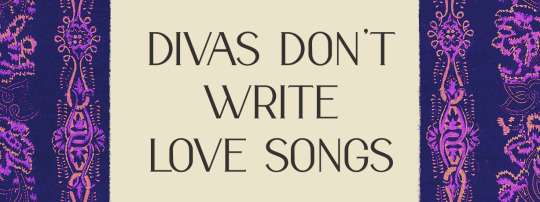
TEAM DIVA
Nanna Laslow Yuri
Shez (M) Ingrid Azama Elincia
Letizia Ignatz Edelgard Merric
PROLOGUE [August 1st - August 3rd]
Tag: #UnscriptedDiva2022
Book Summary:
Delancey Simmons is a girl on a mission: to rise up from the dredges of her past and pursue her dream of being the next musical sensation. The public cries out for real music, something that isn’t processed and manufactured for mindless consumption... or so she thinks. A year has passed since Delancey’s “debut”, and all she has to show for it are three gigs at empty bars and a water bottle jingle.
Wavering from her convictions has never been Delancey’s style. But when a one-off submission to Stairway to Stardom nets her a live audition, she can’t help but be intrigued. It’s almost everything Delancey hates, but if it’s for a chance to grasp at the one thing she loves, contrived TV drama and hot guys won’t stand in her way.
Bright neon lights sear FIREY EMBLEMS: GACHA GACHA GO!! into your vision.
Some of you find yourselves dressed in very familiar clothes: the ones you have worn most throughout the war back home, though the quality leaves much to be desired. The castle you’re in—no, it’s not a castle at all, but even you could have been fooled. People buzz around the set with props and papers in hand, frantically getting everything into place. “Look here,” one woman says to you, pulling your chin forward and brushing rouge onto your cheeks. A man, holding a contraption similar to what the Projector brought to the Ethereal Ball, roams through your group, capturing images of all of you. “C’mon girls, give me something!”
One woman’s voice rises through the din of a production in motion: “Firey Emblems! Your spirit shall shine...!”
—
"One, two, three—”
A band begins playing behind you. The massive audience before you erupts in perfectly-timed applause, smiling widely at all of you. Some of you have ended up here, sitting under hot lights and with strange contraptions pointed directly at you, following your every move. A trap? But everyone seems to be having a fun time. Everyone, that is, save for the one unfamiliar face in your ragtag group who is looking quite sullen.
“...That interview was a disaster. The quiz show will be even worse...”
What you know:
You’ve all been thrown into grand productions and have absolutely no idea what is going on. You are here. There is no escape from what lies ahead.
Nanna, Ingrid, Elincia, Letizia, and Edelgard are all on the set of an upcoming Firey Emblems: Gacha Gacha Go!! commercial featuring the stars of the newest season of Stairway to Stardom. They have all been dressed in the appropriate fashion, thankfully in clothes that look familiar to you, but you’ve heard whispers of more costumes...
There is a sixth member in your group, Delancey, belting out notes on the set.
Meanwhile, Laslow, Yuri, Shez (M), Azama, and Merric all swelter under the shining stage lights of The Kinda-Late Show with Ryan Schuyler. All of you are dressed in tight suits, each of you in a different corresponding color. You can see a busty woman lurking behind stage, watching you, pinching the bridge of her nose at you.
Behind you, a large screen looms overheard with all of your pictures and names displayed. Laslow, Yuri, Shez, Azama, Merric... and Julian, the grump spelling your doom.
What to do (suggestions):
Fake it till you make it, baby!!
You have until 11:59PM EST on August 3rd to make any changes to your inventory.
Follow the Diva sideblog. NPCs can be interacted with through this sideblog or through Tupper in your team Discord channel.
Interact with teammates to establish your roles. Remember, the Projectionist has written you all in as characters of the story.
Talk to Mod Bren for additional information.
3 notes
·
View notes
Text
Philip Schuyler to Elizabeth Hamilton, Albany, [February 7, 1785]
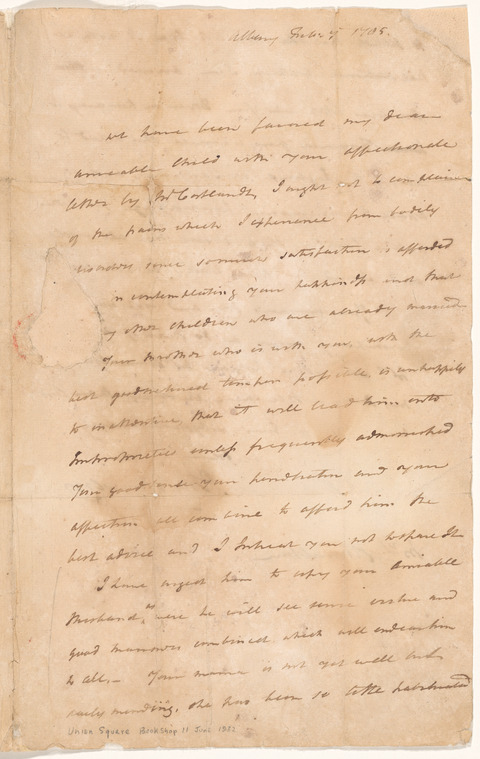
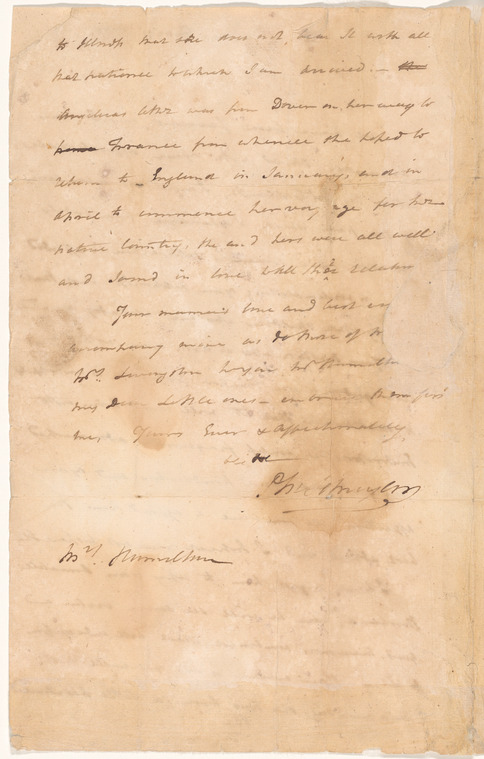
Albany February 7, 1785
We have been favored my dear amiable child with your affectionate letter by Mr. ___ I ought not to complain of the pains which I experience from bodily disorder since so much satisfaction afforded me in appreciating your happiness and that of my other child who are already married.
Your Brother who is with you, with the best grandchildren ___ possible, is unhappily too inattentive that it will ___ unless frequently administered your goodness and your attention and your affection. ___ afford him the best advise and I ___
I have urged him to copy your Amiable Husband as where he will see sense, virtue and good manners combined, which will endear him to all.
___ & which I received Angelica's letter was from Dover on her way to France from whince the hoped to return to England in January, and in April to commence her voyage for her native Country. She and hers were all well and Send in love which they return.
Your Mama's love and best rememberances as to you, Mr. Hamilton, my dear little ones. Embrace them for me.
Yours Ever & affectionately
Ph: Schuyler
Mrs. Hamilton
#hamilton correspondence#elizabeth hamilton#elizabeth schuyler#schuyler correspondence#philip schuyler#1785
7 notes
·
View notes
Text
“Let me tell you...” Hamilton to Laurens, 16Sept1780
History of this letter: it is currently with the Massachusetts Historical Society. It may have once been in the possession of Tristram Coffin (I do not know how he came to be in possession of letters to John Laurens; see my prior post on how the 30June1780 letter came to be in possession of the Hamilton family) and perhaps donated to them. The MHS may have more details about how they came to acquire this letter.
I do not know when this letter first makes an appearance in Hamilton biographies. We can be fairly certain that the Hamilton family was not in possession of this letter through the 19th century: John Church Hamilton noted (1840) that the only letter he had received in response to an inquiry was the April1779 letter from his father to Laurens, and by publication of his History of the Republic vol 2 (late 1850s-early 1860s) they had the Aug1782 letter from Laurens to Hamilton. This letter also does not appear in Henry Cabot Lodge’s Alexander Hamilton (1882) nor can I find it in his Works of Alexander Hamilton (1904-1910) or Allan McLane Hamilton’s The Intimate Life (1910), both of whom had access to the Hamilton family papers. Notably, the missing 12Sept1780 letter from Laurens to Hamilton also does not appear in any of these volumes, suggesting that it was lost well before the earliest biographies of AH supported by his family. Before any nefarious conclusion is drawn, I’ll state that an enormous number of letters are missing, including at least 30 letters to Elizabeth Schuyler/Hamilton between 1780 and 1781, and she would have been most likely to preserve her husband’s letters to her. We can also consider James McHenry’s comments on AH’s forgetfulness/carelessness with letters sent to him:
...recollecting that you are a little subject to lose [letters] by not putting them into your [pockets]...McHenry to AH, Oct1792
And that AH sometimes destroyed the letters he received:
I will willingly testify what you mention respecting Mr Cabot but having torn up your letter trusting to my memory...AH to Wolcott, 13Jun1795
It’s in some of the links below, so I’ll briefly state that AH marrying while still in military service is unusual, even rare, among his social circle. Almost everyone else waits until their military service or public duties are complete before marrying, even if it means that their courtships span years. But AH was also desperately unhappy in early 1780 - in a letter to Laurens (8Jan1780), he wrote:
I am chagrined and unhappy but I submit. In short Laurens I am disgusted with every thing in this world but yourself and very few more honest fellows and I have no other wish than as soon as possible to make a brilliant exit. ’Tis a weakness; but I feel I am not fit for this terrestreal Country.
About a month later, and after a few other recorded flirtations/romances of AH with other women during that period, Elizabeth Schuyler enters the picture (according to a letter from Kitty Livingston to Sarah Jay, ES arrived in Morristown in February 1780). By early April, their engagement is approved by her parents. Fast forward to Sept 1780, and only ten days before this letter to Laurens, AH wrote ES the following [6Sept1780]:
I was once determined to let my existence and American liberty end together. My Betsey has given me a motive to outlive my pride...
AH’s disgust with the operation of the army and repeated refusals to give him a rank and command commensurate with his abilities/experience continues, but now at least he has an alternative, the opportunity to make another life-plan. Indeed, around this time he is planning a 6+ month leave from the army following his wedding, which they were at this time anticipating for early November at the latest. Philip Schuyler is in and out of headquarters, likely contributing to the wedding talk, and McHenry also likely composes and send his wedding poem to AH at this time. In the above 6Sept1780 letter to ES is also where he composed these lines subsequently crossed out:
Do you know my sensations when I see the sweet characters from your hand? Yes you do, by comparing [them] with your [own] for my Betsey [loves] me and is [acquainted] with all the joys of fondness. [Would] you [exchange] them my dear for any other worthy blessings? Is there any thing you would put in competition[,] with one glowing [kiss] of [unreadable], anticipate the delights we [unreadable] in the unrestrained intercourses of wedded love, and bet your heart joins mine in [fervent] [wishes] to heaven that [all obstacles] and [interruptions] May [be] speedily [removed].
So this is what we have of AH’s headspace re ES around this time: romantic, quite lustful, eager to be married to her.
Before my analysis, I encourage comparison to the content, tone and language in AH’s letter to Laurens of 12Sept1780. Especially towards the end of that letter, AH is notably direct about his feelings and emotions, even confessional. This is the emotionally honest AH, complaining about the conditions of the army.
Yet AH wrote Laurens again only four days later, having received a letter that he must have felt he needed to promptly respond to: “I wrote you fully by the post and have just time to tell you that I have received your letter of the 8th.” In this 16Sept1780 letter, AH is friendly, but the confessional aspect is missing. Whatever was in that 8Sept1780 letter has upset him a bit, which we will see below. Breaking it down:
I wrote you fully by the post and have just time to tell you that I have received your letter of the 8th.1 & that tomorrow morning I set out with the General for Hartford to an interview with the French General and Admiral.2 My hopes increase, that Guichen is coming to enable us to act.3 For your own sake, for my sake, for the public sake, I shall pray for the success of the attempt4 you mention; that you may have it in your power to act with us. But if you should be disappointed, bear it like a man; and have recourse, neither to the dagger, nor to the poisoned bowl, nor to the rope.
AH is urging Laurens to not attempt an honorable death, and in poetic terms. If suicide was AH’s serious concern, I doubt he would phrase it so cutely: “the poisoned bowl.” I also don’t think the rest of the letter would continue in the tone or with the content it does, with the frequent references to AH’s fiancee and his wedding.
That you can speak only of your private affairs shall be no excuse for your not writing frequently. Remember that you write to your friends, and that friends have the same interests, pains, pleasures, sympathies; and that all men love egotism.
AH is reminding Laurens to write - to his friends - which I do not think he’d spend time doing if he were seriously concerned Laurens was suicidal.
In spite of Schuylers black eyes, I have still a part for the public and another for my friends [above insert] you; so your impatience to have me married is misplaced; - a strange cure by the way, as if after matrimony I was to be less devoted than I am now.
This is the first (and only) letter where AH refers to Laurens’ impatience to see him married. Within the context of what was going on in early September - McHenry sending the poem to AH about his wedding, AH discussing his planned leave, AH expressing elsewhere that marriage and military service should not mix - also see this post also linked below on “Empire of Hymen” - I suspect talk about AH’s upcoming wedding - which they had at this time planned for late October/early November - had reached Laurens.
We can only guess that there was a “hurry up and get married so you cease to be preoccupied with your wedding to her and can focus on Army/public goals” notion in the missing 8Sept1780 letter, perhaps also in response to AH’s 12Sept1780 letter where he was clearly openly expressing his troubles. Perhaps Laurens felt once AH was married to ES, his frustration would lessen, although we cannot be sure. In this conjecture, I am informed by both Laurens’ and the Marquis de Lafayette’s examples of husbands who certainly placed military duty over matrimony. But does AH share this belief? AH expressed the following sentiments to ES (20Jul1780): “I hope for a decisive campaign. No one will desire it more than me; for a military life is now grown insupportable to me because it keeps me from all my soul holds dear.”
Next phrase:
a strange cure by the way, as if after matrimony I was to be less devoted [missing prepositional phrase] than I am now.
Notice the “as if” - as in, it’s really bizarre that this would be suggested. Based on the sentence structure, there are three things that could be the object of this phrase:
1. “a strange cure by the way, as if after matrimony I was to be less devoted to the public than I am now.” We already know he intends to be less devoted to the public - this is repeated by him in letters often enough during this time and the next two years.
2. “a strange cure by the way, as if after matrimony I was to be less devoted to you than I am now.” Getting married will naturally reflect less devotion to Laurens, so it’s hardly a strange cure. It would be a very obvious (attempt at) a cure, nothing “strange” about it. Further, I don’t see evidence that AH showed much devotion to Laurens post-ES’s entrance into AH’s life. I think the strongest reason for this interpretation is that “you” [Laurens] is the last in the list.
But there’s also another problem with this interpretation - AH wrote “In spite of Schuylers black eyes, I have still a part for the public and another for my friends [above insert] you; so your impatience...” The “you” is edited in by AH (we assume). AH probably initially wrote that sentence as follows:
In spite of Schuylers black eyes, I have still a part for the public and another for my friends; so your impatience to have me married is misplaced; - a strange cure by the way, as if after matrimony I was to be less devoted than I am now.
I don’t think it’s likely he was arguing that matrimony would be a strange cure to devotion to his friends, either. (AH will plead in letters to his friends dated from 1781 and 1782 that either his matrimonial occupations or family matters or his studies to support his family have delayed his writing to them.) But the [you] as an insert above the sentence makes the argument that he was referring to Laurens specifically even more doubtful when he wrote the full sentence.
3. “a strange cure by the way, as if after matrimony I was to be less devoted to her than I am now.” Unusual sentence structure apparent, “to her” is the only logical reading of this phrase. The usual promise of matrimony is to be devoted to one’s spouse - it’s a “strange cure” to suggest that matrimony would make one less devoted. Marrying ES certainly would be a “strange cure” to devotion to her. AH is writing that he still has a part for the public and for friends Laurens so there’s no reason to be impatient about his wedding, but getting married will be no cure for a devotion to ES. About a year later, AH writes to EH that he’s not even factoring in the public anymore and intends to “[devote] myself wholly to you.”
I have noticed how often the very next line is skipped in books although it’s a context clue for the prior sentence. But it starts “Let me tell you,” i.e., make special note of this; let me make this clear to you; this is important:
Let me tell you, that I intend to restore the empire of Hymen and that Cupid is to be his prime Minister.
AH is expressing the type of marriage that he plans to have - one of strong romantic/erotic attachment within the “sacred ties” of matrimony that Hymen binds. He is telling Laurens to take note that his marriage will fit within the ideals of the companionate marriage: AH intends to restore the land of the god of marriage (Hymen), where the god of love/romance (Cupid) will lead. Hymen and Cupid were common images of an ideal companionate marriage - Hymen joins the partners in sacred bands; Cupid ensures their romantic/erotic attachment to each other. People had jewelry (wedding bracelet ca NYC 1785), medallions, even performances with persons costumed as Cupid and Hymen as part of their wedding celebrations. The chaste, morally scrupulous John Adams used the phrase “Cupid by Hymen was crown’d” to express this ideal of marriage and romantic love joined. Humorous and somewhat bawdy poems were written expressing fear that Cupid and Hymen would not be attendants to one’s marriage (leading to an indifferent sex life), or Cupid kindling the torch of Hymen (ensuring love and romance within marriage).
Laurens would have gotten the reference right away. Once one understands the Cupid and Hymen reference, it’s even more obvious that the object of devotion in the prior sentence is ES.
AH is also making clear - let me tell you - that his marriage is not a cynical endeavor just so he can rise in station through a family connection, but one that he intends to fit to the ideal marriage. In the next several lines, AH continues to present Laurens with images of his own attachment and partnership with ES. [An aside: “Cupid and Hymen” was also the title of a published 1775 fable by Thomas Paine or Philip Freneau (authorship unclear) that was an attempt at allegory to the British and its colonies.]
I wish you were at liberty to transgress the bounds of Pensylvania.
One could think this is a bawdy reference, and for awhile I thought AH meant it in a “violation of religious obligations” sense (since he is using other religious terms in this and other letters to Laurens), but considering AH’s other usages of the word “transgress,” I think he simply meant to do something illegal - violate parole.
I would invite you after the fall to Albany to be witness to the final consummation.
I think there’s some wordplay in “after the fall”, referencing religious terminology - echoing the fall of man because of a woman - that reflects phrases he’s used in letters to Laurens re ES before, “my doom,” “guilty,” “confess my sins.” AH is trying to get some wordplay about the time of year and his “fall” into this relationship with ES that also makes him unworthy to be a soldier (or weak, as McHenry described it). The sentiment is similar to one who uses about a month later in a letter to ES:
I would not have you imagine Miss that I write to you so often either to gratify your wishes or to please your vanity; but merely to indulge myself and to comply with that restless propensity of my mind, which will not allow me to be happy when I am not doing something in which you are concerned. This may seem a very idle disposition in a philosopher and a soldier; but I can plead illustrious examples in my justification. Achilles had liked to have sacrificed Greece and his glory to his passion for a female captive; and Anthony lost the world for a woman. AH to ES, 13Oct1780
I have written about final consummation a lot, as it has specific meaning that is not “sexual consummation.” To summarize, the meaning of this sentence, using the final consummation metaphor, is “I would invite you after the fall [of man because of a woman] to Albany to witness [the end of the world/the consummation of all things in Christ].” AH is drawing a sharp line between his life pre- and post-nuptials - emphasizing how it will be forever changed in a manner comparable to major religious events in the Christian tradition - actually comparing it to the culminating event of unity between God and the world in Christian belief. He’s also taking the opportunity to reference his wedding and invite Laurens to witness this change, possibly in case he has any doubts about AH’s sincerity for his life-changing marriage.
My Mistress is a good girl, and already loves you because I have told her you are a clever fellow and my friend; but mind, she loves you a l’americaine not a la françoise.
AH states that ES is a good partner for him and lets Laurens know that he has already disclosed his friendship with Laurens to ES (he refers to Laurens as “My Laurens” in an earlier letter to her); and he’s bragging here about how much influence he has over ES (she loves you because I’ve told her you are clever and you are my friend) and showing their unity in these matters. AH is also letting Laurens know that her love for the latter is not romantic/sexual. But with the Hymen/Cupid use, the “consummation” reference, and the reference to “Schuyler’s black eyes” - noting something he finds attractive about her - AH could have just written “In spite of Miss Schuyler,...” - AH shows how much HE thinks about romantic/sexual engagement with ES (which we already know from his letters to her from this period, in addition to the reference about how sexually pleasing ES is to him in his 30June1780 letter to Laurens). AH was also jealous at the thought of another man watching her sleep in his own dream and wanted her sister to report on every flirtation. He had some pretty strict notions of chastity and fidelity for ES.
Adieu, be happy, and let friendship between us be more than a name
A Hamilton
The General & all the lads send you their love [skipping the post-script]
AH’s sign-off, if Laurens hadn’t already gotten the point throughout the entire letter, is also a pretty strong “Be happy, you’re my friend and let’s not be men who just call each other friends.” With all of its allusions to life-changing events, romantic/sexual love in marriage, and references to ES, this letter is providing Laurens with AH’s framework of his life moving forward. AH felt this was so important for Laurens to understand that he provided a response only four days after his prior letter, likely because he knows (or suspects - we are really missing a lot by missing the earlier letter) that Laurens has heard about AH’s planned lengthy leave, his thoughts (with Meade) about leaving the army entirely, and so on.
Given the timing of this letter, AH clearly thinks that two things are important to tell Laurens- 1) that his own marriage is not some cynical endeavor and it will take priority in his life; 2) that Laurens will continue to have a role to play as his friend.
However, AH is evading directly telling Laurens about his (now seriously wavering) commitment to continuing with the military duties he currently has, and public life (although this was perhaps in another letter, now lost). AH wants to get a command and then get out and go about the business of supporting a family with ES. All these references to his marriage and relationship with ES show where his focus is, while not outright revealing his career and life plans - take an extended leave, get married, study the law, try to get a command*, then leave the army - that he does in his letters to others. I speculate that he’s concerned that Laurens will be, at the least, disappointed in him, which is also reflected in all the dire language in this and the June letter to Laurens about guilt and doom, confessing his sins, the fall of man and the end of the world. His fear that Laurens will think less of him is very real; thus, all the emphasis on their friendship, while not confessing outright his plans to leave the army entirely if he doesn’t get his way. After about two years of disappointments, AH is enticingly close to the solution to many of his problems, both personal and professional, and analytically-driven as he was, has formulated a new life plan that puts him in a different sphere from Laurens.
There have been questions raised about why this letter isn’t quoted in every recent biography of AH to communicate something about his relationship with Laurens. My response is that once one understands the references, it’s not that interesting of a letter except for AH’s wordplay and use of mythological/religious allusions. The statements he makes here are consistent with the statements he makes in his letters to ES in 1780 and through the following year - there are numerous other examples of him writing emotionally about his marriage, his feelings for ES and his devotion to her, and how life-changing her entrance into his has been and the plan he hatches to get his way/get out of the army. Flexner quotes this letter, but also includes an insert: “a strange cure by the way, as if after matrimony I was to be less devoted [to her] than I am now.” There are others that cut off the quote before “Let me tell you,” I suspect because the author doesn’t know the allusion.
Back to the beginning of this letter, considering how AH goes on to Laurens with references to his wedding and feelings for ES, it’s difficult to believe he really thought Laurens was suicidal - the expression seems more poetic than anything.
Links to prior posts, some already linked above:
AH on marriage Part 1, Part 2, engagement timeline, Part 3, Part 4, more about AH, McHenry, and Pope, AH telling JL about his engagement and the timeline, some more about AH/Laurens and public service , AH’s views that marriage and military service should not mix that links most of the other posts too.
*AH’s desire to have proved himself in combat remains, likely because he sees that his influence in his future career will be embellished by having been a war hero. Here are some references:
Sometime last fall when I spoke to your Excellency about going to the Southward, I explained to you candidly my feelings with respect to military reputation, and how much it was my object to act a conspicuous part in some enterprise that might perhaps raise my character as a soldier above mediocrity. AH to GW 22Nov1780
You know I shall hate to be nominally a soldier. AH to Greene, 19Apr1781
He would remain a hawk throughout his life.
5 notes
·
View notes
Photo
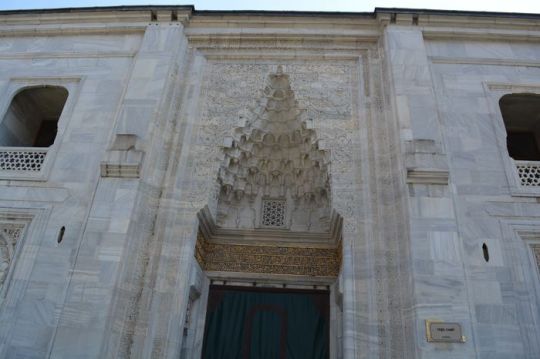
Januarius Aloysius MacGahan A Champion of Justice and Truth
Friendship and Valor in War
After joining the Russian army, Januarius Aloysius MacGahan forged sincere friendships with General Skobelev and General Gurko. He actively participated in all major battles for the liberation of Bulgaria, including the pivotal battles of Plevna and Shipka. His vivid descriptions of these battles stand as remarkable examples of journalism, capturing the intensity and heroism of the struggle for liberation.
Sacrifice and Service
Despite suffering a broken ankle, MacGahan remained steadfastly present at the frontlines throughout the Russo-Turkish War. His unwavering commitment to documenting the realities of war led him to Istanbul, where, exhausted and afflicted with typhoid fever, he passed away on June 9, 1878, at the age of 34. In his untimely death, MacGahan’s destiny became forever linked with the liberation of the Bulgarian people, a cause he served with unwavering dedication Sightseeing Turkey.
Investigating Atrocities
The reports on the April uprising in Bulgaria emerged from a conflict between the British government and the liberal leadership of the “Daily News,” led by Frank Hill, the chief editor. The “Daily News,” renowned for its well-organized foreign service, published a series of letters by correspondent Edween Pears, detailing monstrous atrocities in Bulgaria. These reports stirred doubts among the British public regarding the government’s Balkan policy.
Seeking Truth
To address public concerns and refute government accusations, the editorial board of the “Daily News” launched an inquiry, dispatching Januarius Aloysius MacGahan as a special commissioner to Bulgaria. MacGahan’s impeccable journalistic credentials made him uniquely suited for this mission. Simultaneously, the British government initiated its own official inquiry, led by Sir Henry Elliot and Walter Baring. Additionally, American Minister Maynard tasked General-consul Eugene Schuyler with investigating the atrocities.
Parallel Investigations
MacGahan’s investigation ran parallel to those of Schuyler and Baring. Schuyler and Baring, initially appointed to challenge MacGahan’s accounts, became supportive of his findings. While Schuyler’s report, published on August 28th, corroborated MacGahan’s observations, Baring, guided by a pro-Turkish stance, contradicted his earlier instructions to discredit MacGahan’s reports.
Legacy of Truth
Januarius Aloysius MacGahan’s legacy as a fearless journalist and advocate for justice endures. His courageous reporting and dedication to uncovering the truth about atrocities in Bulgaria not only galvanized public opinion but also reshaped diplomatic discourse. Through his unwavering commitment to truth and justice, MacGahan left an indelible mark on the history of journalism and human rights advocacy.
0 notes
Note
Do you have any book recs?
always do! I find it easier when people specify what books/authors they are drawn to but I can just give you some books I especially enjoyed reading in 2023 so far (they have a lil red heart in my reading notebook) : lit by mary karr, the correspondence between antoine & consuelo de saint exupéry, seeing the body by rachel eliza griffiths, in the dream house by carmen maria machado, a dangerous place by chelsea desautels, les choses humaines by karine tuil, collected poems by james schuyler, the raptures by jan carson, burn lake by carrie fountain, the idiot by elif batuman & faith, hope and carnage by nick cave
76 notes
·
View notes
Photo

Unveiling Horrors The Journey to Batak
A Grim Revelation
Since my last correspondence, each passing moment has unfolded a new layer of horror, leaving me shaken to the core. There is no tale of Turkish brutality that I do not now find credible, no atrocity beyond the realm of possibility. The Turks have surpassed all limits of barbarity, reaching a point where mere words fail to convey the depth of their depravity.
A Threshold of Inhumanity
There comes a point where the atrocities become so egregious that rational analysis falters, and the mind recoils in horror. The path forward is obscured by mountains of unspeakable cruelty, rendering further investigation futile. It is a realm where moral compasses shatter, and the soul cries out for respite from the relentless onslaught of brutality Private Guide Turkey.
A Perilous Journey to Batak
Our journey to Batak was fraught with obstacles, as local authorities, aggrieved by Mr. Schuyler’s refusal to be accompanied by Turkish officials, sought to impede our progress. Despite their efforts to thwart us, the resilience of the villagers prevailed, as they clandestinely provided us with horses to continue our journey.
Defying Oppression
In the face of official prohibition, the villagers defied orders with remarkable determination, initially presenting us with horses without saddles as a subtle protest. Undeterred, we requested saddles, prompting the villagers to swiftly comply, their actions a silent rebuke to the oppressive dictates of authority.
Unified Resolve
Amidst the challenges and uncertainties of our journey, the unwavering solidarity of the villagers emerged as a beacon of hope. Despite the specter of retribution, they stood united in their defiance, demonstrating an indomitable spirit in the face of tyranny.
A Testament to Resilience
As we embarked on the next leg of our journey, the echoes of the villagers’ resolve lingered in the air, a poignant reminder of the human capacity for resistance in the darkest of times. In their defiance, we found inspiration, reaffirming our commitment to bearing witness to the unspeakable horrors that awaited us in Batak.
0 notes